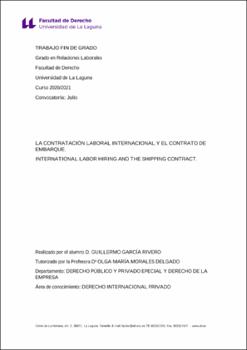La contratación laboral internacional y el contrato de embarque.
Author
García Rivero, GuillermoDate
2021Abstract
International labour relations subject to regulation through rules of private
international law are characterized by the presence of foreign elements,
either in the subject of the labour relationship, employer and/or worker, or
at the place of provision of services.
At the present time, there is a great increase in international employment
contracts by the phenomenon of the globalization, migration, and
multinational companies, linked to the phenomenon of free movement of
workers, business establishment and services within the community
territory, which has motivated its legal regulation at the European level.
The current legal regulation is the product of the community legislator,
because of article 81 of the TFEU, which has transferred legislative powers
of the Member States to the European Union itself, reason why there has
been a “communitarization” of this matter, that is regulated homogeneously
throughout the EU through community regulations, both the determination
of the international jurisdiction and the law applicable to these international
contracts.
Likewise, we analyze the specificities of the international shipping contract,
which is the employment contract on board a ship with foreign elements,
and that very often presents the problem of confusion to identify the
maritime entrepreneur and the use of flags of convenience, which will
affect its international regulation. Las relaciones laborales internacionales objeto de regulación mediante
normas de Derecho Internacional Privado, se caracterizan por la presencia
de elementos extranjeros bien en los sujetos de la relación laboral
empresario y/o trabajador, o bien en el lugar de la prestación de servicios.
Al momento actual se constata un gran incremento de los contratos de
trabajo internacionales por el fenómeno de la globalización, las migraciones
y las empresas multinacionales, unido al fenómeno de la libre circulación
de trabajadores, establecimiento y servicios de las empresas dentro del
territorio comunitario, lo que ha motivado su regulación legal a nivel
europeo.
La regulación legal actual es producto del legislador comunitario, como
consecuencia del artículo 81 del TFUE, que ha cedido competencias
legislativas de los Estados miembros a la propia Unión Europea, por lo que
se ha producido una “comunitarización” de esta materia, que se regula de
forma homogénea en toda la UE mediante Reglamentos comunitarios, tanto
la determinación de la CJI como la Ley aplicable a estos contratos
internacionales.
Asimismo, analizamos las especificidades del contrato de embarque
internacional, que es el contrato de trabajo a bordo de buque con elementos
extranjeros, y que presenta muy a menudo la problemática relativa a la
confusión para identificar al empresario marítimo y la utilización de
pabellones de conveniencia, lo que va a afectar a su regulación
internacional.





